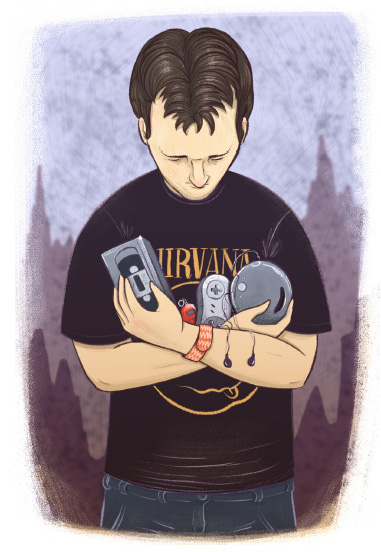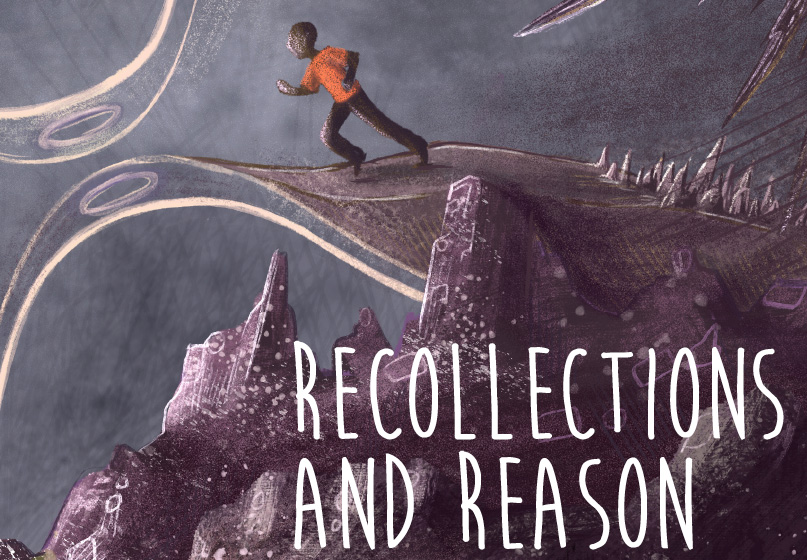WRITTEN BY TYLER SPINOSA
ILLUSTRATED BY BEATRIZ ESPINOSA

Ever smell some old cologne or cigarettes burning outside in the summer air and get transported back to a comforting memory of the past? No matter how old you are, wanting to go back in time is a natural desire, especially for anyone who wants to escape an embarrassing moment or just doesn’t want to get up for class. Sometimes we just want to go back to a simpler time. But are you so concerned with re-creating the blissful warmth of the past that it interferes with your capacity to exist in the present?
Nostalgia is a concept that’s intertwined with the core of human consciousness, self-awareness and mortality. It’s a shared experience across history that has deeply affected all levels of civilization and culture. Nostalgia is such a powerful sentiment that it can irrevocably change the course of a society for better or worse. Merriam-Webster defines nostalgia as “a wistful or excessively sentimental yearning for a return to or of some past period or irrecoverable condition.”
My childhood memories are a minefield of nostalgia. I remember staying up late to watch cartoons every Friday, and eating Doritos while watching the entire original “Star Wars” trilogy. My cousins and I liked to make forts out of toy chests and furniture, then gather up all of our Nerf guns and defend the base from imaginary enemies. We spent several summers planning sleepovers and excursions to the pool.
My favorite memory though is from my first year in high school. I loved staying home sick. Even if I was actually sick and not just feigning an illness, I could always enjoy myself. I remember one morning during my freshman year, I woke up at dawn and decided to take the day off. My mom came to wake me up, and I told her I was having stomach problems, so she went to work and left me alone to play video games, eat snacks and watch DVDs. The idea that other people were busy at work or school and I was at home relaxing was deeply satisfying, especially now that I have bills and deadlines and actual responsibilities.
However, nostalgia often idealizes the past in an unrealistic way. We forget that going back to high school might be as miserable as it would be fun. As much as we idealize our childhoods, most children that grew up through the 1990s and early 2000s experienced an exponential shift in technology and political attitudes. We witnessed 9/11, a housing market crash and recession, an exponential increase in mass shootings and years of conflict in the Middle East.
 Popular media also contributes to the over-idealization of the past. New formats provide an opportunity for remakes, revivals and refurbished releases of all sorts of old titles in movies, music, television, and video games every year. One explanation is that this trend is completely the fault of the media companies, but it isn’t that they have refused to dip into a well of original ideas. The audience continues to purchase the products they re-release out of a completely nostalgic impulse. As the capacity of media based technology expands, the market will continue to capitalize on the successes of past ideas to draw in a guaranteed customer base. The problem is that the media often sugarcoats problems of the past.
Popular media also contributes to the over-idealization of the past. New formats provide an opportunity for remakes, revivals and refurbished releases of all sorts of old titles in movies, music, television, and video games every year. One explanation is that this trend is completely the fault of the media companies, but it isn’t that they have refused to dip into a well of original ideas. The audience continues to purchase the products they re-release out of a completely nostalgic impulse. As the capacity of media based technology expands, the market will continue to capitalize on the successes of past ideas to draw in a guaranteed customer base. The problem is that the media often sugarcoats problems of the past.
“Stranger Things” might bring a wistful sentimentality for the 80s, but I’ve heard mixed things about the Reagan administration. I also have a personal love for Vietnam-era music, but at the same time I’m aware that it might give other people a PTSD flashback. Although I love the music and art from the 60s and 70s, that era was juxtaposed with racial tension, assassinations and war.
Even if there is recognition of the issues of the time, the glamour of the narratives tends to outshine everything else. The comforting memories that breed nostalgia remove a great deal of context and realism from the original situation. Only the fun parts survive the test of time. It is rare that a complete and unbiased account of events will be achieved solely through memory.
This sentimentality for the past speaks to a realization of impermanence that’s part of the human condition. Impermanence is the feeling when you watch the final episode of your favorite TV show. It’s a knowledge that something you love will go away forever. You can always pinpoint it by the deep sinking feeling, like your chest is being crushed. The feeling of impermanence deals heavily with mortality. Death makes time valuable, finite and fleeting. This realization is the source of the core existential dilemma that defines the human condition. Most people on some level are forced to think,“What makes my life so special that God will exempt me from a surprise appointment with the angel of death?”
Contemplation of time and the inherent meaningless of life lends itself to a romanticization of preserving time gone by. As such, nostalgia is simply a reaction to the feeling of impermanence and essentially functions as a form of escapism.
It’s not surprising then to learn the science behind nostalgia and the similarities between nostalgia and other forms of escapism, like recreational drugs. Research from the University of Southampton identified that the body’s reaction to nostalgia centers around the release of dopamine. Common sensory triggers for nostalgia are taste and smell. These triggers communicate with the brain through the amygdala, which is part of a larger subset of areas in the brain known as the limbic system. The limbic system houses the portions of the brain that are associated with emotion and memory. A 2006 study from the University of Southampton asked participants to describe when they become nostalgic. The most frequently reported trigger was a negative effect: in the study, participants said, ‘‘I think of nostalgic experiences when I am sad as they often make me feel better’’ and the study also reported “loneliness was the most frequently reported discrete affective state.”
So in this case, if the source of nostalgia can be traced back to the limbic system, and the most common trigger is a negative effect, then what does that mean in terms of human evolution? Is nostalgia a positive tool or a toxic hindrance to healthy psychological progression?
For those with dopamine regulation problems, like myself, nostalgia can become a permanent problem. Conscious and unconscious decisions might cause a particularly nostalgic person to construct their lives in a way that facilitates the maximum amount of nostalgic triggers surrounding them at any given time. That obsession with the past can also cause a disregard for the present and ultimately lead to a mishandling of the future due to an inability to adapt and move on.
If anything, I’m a nostalgia addict. I structure the majority of what I do around nostalgia triggers. I wear a certain deodorant, listen to certain music, watch specific TV shows and movies and eat particular meals — all in conjunction with each other to recreate feelings from the past.
The fact that something from the past was impermanent is part of what makes it so significant. The meaning of those memories is genuine, but a fixation on them can become a detriment to continued progress. Anand C. Paranjpe illustrated this in “Self and Identity in Modern Psychology and Indian Thought,” when he said, “If one has recognized that material possessions and social selves are impermanent and is yet strongly emotionally attached to them, one is not truly self-realized.”
Although I’ve recognized my tendency to seek out nostalgia as a pattern of behavior, my aim is to try and regulate how heavily I indulge in my nostalgic impulses. There’s no sense in sacrificing who I could be for who I am now. Occasionally, I can let myself enjoy a daydream or two, but trying to live inside those thought bubbles is a guaranteed path to ruin.
As with many things, moderation is the key to reaping the benefits. Small concentrated doses of nostalgia can be refreshing, enjoyable and even result in interesting improvements for the future. However, when nostalgia is abused like a drug, it can cause an unhealthy fixation with the past and foster a fundamental denial of the current situation. At its core, the fixation on the past stems from an inability to reconcile with the impermanence of being.
This is true whether you willingly seek out the feeling of nostalgia, or simply find yourself wearing a lot of 80s trends or watching old TV shows from your childhood. More than anything, nostalgia always remains bittersweet because of the juxtaposition of positive memories paired with the pain of lost time.
“We can’t completely rid ourselves of the impulse to return to the past, because of how scary the future is, but we can use it as a regulated way to cope with lost time while still striving towards something more.”
